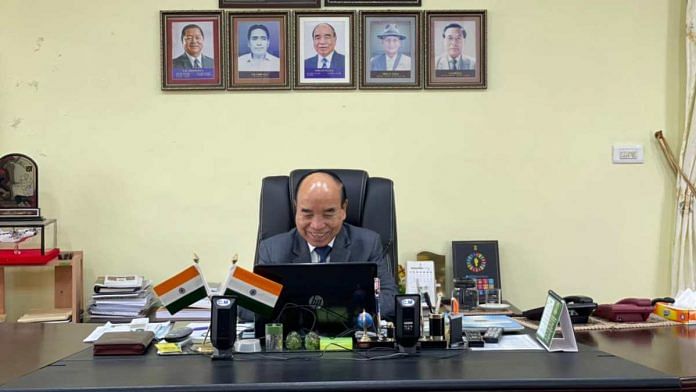
New Delhi: There’s unlikely to be any headway in the refugee crisis as Mizoram Chief Minister Zoramthanga Sunday spoke to Zin Mar Aung, Myanmar’s Foreign Minister in exile, and not the current foreign minister, Wunna Maung Lwin.
This has kept the refugee crisis facing India an “open-ended question”, multiple sources told ThePrint.
Mizoram has been facing an influx of refugees from Myanmar since the last more than one month amid the military crackdown there following the February coup, which overthrew the civilian government led by Aung San Suu Kyi, who continues to be under detention since 1 February.
While Zoramthanga did write a letter to Prime Minister Narendra Modi last week, stating India should not ignore the “humanitarian crisis unfolding in front of us in our own backyard”, he did not seek permission from the Ministry of External Affairs before holding the virtual meeting with Aung, an official source told ThePrint.
On Sunday, the CM announced on Twitter that he had spoken to Zin Mar Aung virtually and “had a fruitful meeting” with him.
Had a fruitful meeting (online) this morning with Zin Mar Aung, Hon'ble Foreign Minister, Myanmar.
Our thoughts and prayers are with #Myanmar in these trying times. https://t.co/QLzZhwTKxC pic.twitter.com/QIw6wVkCxA
— Zoramthanga (@ZoramthangaCM) March 21, 2021
According to sources, while the chief minister did this owing to the pressure he has due to the number of people pouring in on the border areas of his state, his meeting with Aung will “yield no results” because at present the Myanmar government-in-exile led by Suu Kyi is not in a position to address any issue and it still remains an “open-ended question”.
Foreign Minister Lwin, meanwhile, is holding meetings with his counterparts in ASEAN (Association of Southeast Asian Nations) to discuss the situation in Myanmar.
Last month, Lwin held meetings with Indonesian Foreign Minister Retno Marsudi and Thailand Foreign Minister Don Pramudwinai to explore an ASEAN-led solution to the crisis.
Delhi won’t accept refugees from Myanmar
New Delhi has already made it clear at the beginning of the crisis that it would not give refuge to people fleeing Myanmar due to the atrocities being carried out by the military junta.
However, Mizoram — being a state that shares a border with Myanmar — does have the authority, like any other Northeastern state, to directly contact officials there during an emergency, stated another source.
“Situation at Mizoram border with Myanmar has triggered considerable anxiety in Delhi. While local inclination to help shelter-seekers exists, India has to be firm in guarding its borders. Else, 1990-like conditions may be created, causing further complications,” said Rajiv Bhatia, a distinguished fellow at Gateway House, a Mumbai-based foreign policy think tank.
“During 1988-91 period, much oppression by Myanmar Army resulted in the exodus of students and others who were given shelter in large numbers by India,” added Bhatia, a former Indian ambassador to Myanmar and author of ‘India-Myanmar Relations: Changing Contours’.
“This and other measures in support of pro-democracy forces led to very strained ties between New Delhi and the junta. Later, India adopted a two-track policy to woo the military back,” he said.
Meanwhile, the Assam Rifles has ramped up its presence significantly to keep a tight vigil on the India-Myanmar border as the situation remains tense and volatile. It is conducting 24×7 patrols to curb the influx of refugees.
India and Myanmar share a 1,643-km unfenced border along Arunachal Pradesh (520 km), Nagaland (215 km), Manipur (398 km) and Mizoram (510 km), and permit a ‘free movement’ regime up to 16 km beyond the border, thereby making the International Border extremely porous.
(Edited by Debalina Dey)
Subscribe to our channels on YouTube & Telegram
Why news media is in crisis & How you can fix it
India needs free, fair, non-hyphenated and questioning journalism even more as it faces multiple crises.
But the news media is in a crisis of its own. There have been brutal layoffs and pay-cuts. The best of journalism is shrinking, yielding to crude prime-time spectacle.
ThePrint has the finest young reporters, columnists and editors working for it. Sustaining journalism of this quality needs smart and thinking people like you to pay for it. Whether you live in India or overseas, you can do it here.